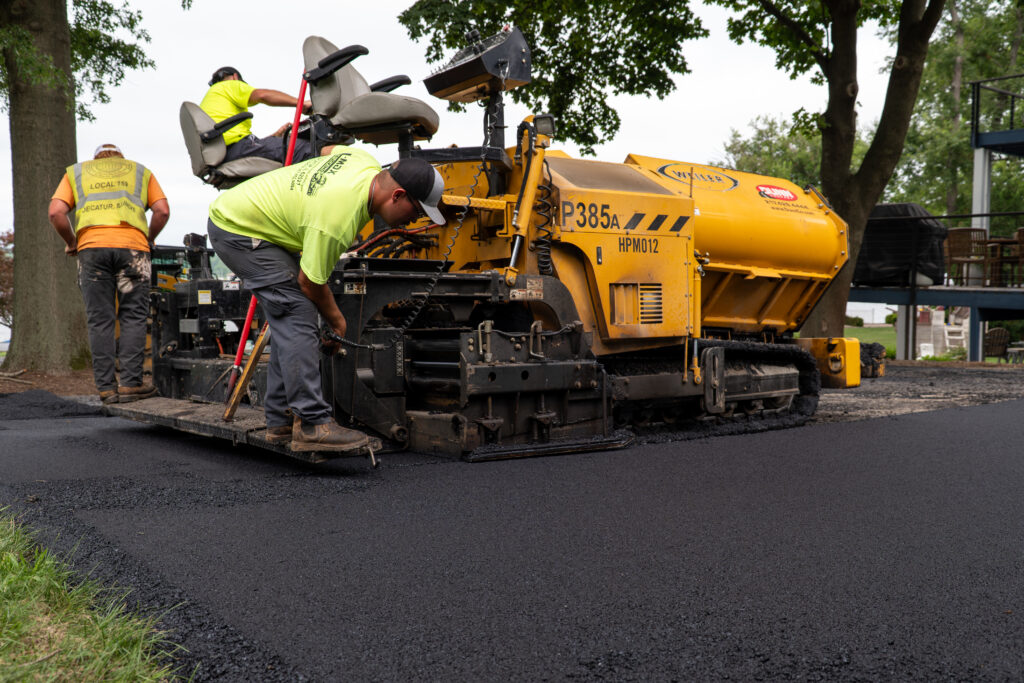Month: August 2025

Proper Driveway Paving = Smooth Lasting Results
A freshly paved driveway doesn’t just improve your home’s curb appeal, it adds real value, increases functionality, and protects your property for the long haul. But not all driveways are created equal. The difference between a surface that lasts decades and one that crumbles within a few years often comes down to one thing: the process.
When done right, your driveway will stand up to daily use, changing weather, and the test of time. But when corners are cut or key steps are skipped, results such as premature cracking, drainage issues, or even the need for a full replacement could develop within just a few years. Quality paving begins with understanding what lies beneath the surface and ensuring every layer is built to last.

At Dunn Company, we believe in doing it right the first time. Here’s why it matters to you as a homeowner.
1. Thorough Site Inspection
Before a single machine touches your property, our team conducts a comprehensive inspection. We evaluate:
- Existing pavement conditions: Is there surface cracking, rutting, or base failure?
- Subgrade conditions: What type of soil lies beneath your driveway? Clay-heavy soils may require more stabilization.
- Drainage and water flow: Water is the enemy of pavement. We check for slopes, pooling areas, and downspout direction.
- Traffic patterns and loads: Do you park large vehicles or equipment? Will there be frequent deliveries?
This step ensures we don’t just repave, we design your project to meet your property’s specific needs.
2. Base Preparation
The base layer of your driveway is like the foundation of your home, without a solid base, nothing else matters.
What makes a proper base?
- Depth: Most residential driveways require 4 to 8 inches of compacted aggregate base depending on subgrade conditions.
- Material: We use high-quality, graded crushed stone for optimal drainage and compaction.
- Compaction: Proper compaction eliminates air voids and creates a dense, stable platform.
Without a properly compacted and stable foundation, the asphalt above is vulnerable to shifting, settling, and cracking over time. This often leads to visible issues like tire depressions, crumbling edges, and uneven surfaces. If the base isn’t right, the surface won’t hold up, no matter how good the asphalt mix is.
3. Smart Drainage
Water infiltration is one of the main causes of asphalt failure. That’s why we prioritize water drainage design before and during installation.
- Proper slope so water runs away from your home and toward designated runoff points.
- Edge reinforcement to prevent crumbling where water tends to pool.
- Seam sealing to keep moisture out of vulnerable joints and transitions.
Even the best asphalt won’t last if water seeps underneath and weakens the base. This can erode or weaken the base, undermining the entire structure. Over time, trapped moisture may freeze and expand, causing frost heave that pushes the asphalt upward and leads to cracking or uneven spots. Even the highest quality asphalt can fail if it is compromised by poor water management.
4. Asphalt Application
After the base is properly installed and compacted, it’s time to pave. We take care to ensure every layer of your driveway is built to last, starting with quality materials and proper thickness.
Proper Thickness for Performance
We apply asphalt at the correct thickness based on the conditions of your property, the expected load, and industry best practices. Applying asphalt too thin leads to early deterioration, while the correct thickness supports longevity, strength, and value.
- Standard residential driveways typically receive 2 to 3 inches of compacted asphalt.
- Heavier-use areas, like those used for RVs or trailers, may require additional thickness for stability.
Consistent, Controlled Installation
Asphalt is applied while hot and must be spread evenly before it cools. Our team uses properly calibrated equipment and precision techniques to ensure a smooth, uniform surface that looks and performs its best.
- Edges are finished cleanly to prevent cracking and separation.
- We monitor temperature, weather, and compaction rates throughout the job to ensure a high-quality finish.
Final Compaction
Every driveway is compacted with precision rollers to bond the asphalt and eliminate air pockets. Our compaction process ensures the surface is sealed, strong, and able to handle both vehicles and weather over its lifetime.
6. Aftercare & Maintenance Tips
Once your new driveway is installed, proper care helps you get the most out of it:
- Avoid parking on the new surface after installation.
- Sealcoat to protect against UV rays, oxidation, and surface wear.
- Don’t use sharp objects or heavy equipment on the surface to avoid scraping or damaging the surface.
We’ll walk you through best practices so you can preserve your investment for years to come.
Your Local Paving Experts
We’ve been paving roads, driveways, and parking lots for decades. But what sets us apart is our commitment to long-term quality and customer service. We don’t just show up with machines, we show up with a plan, tailored specifically for your property, your needs, and your future.
Ready to Invest in a Better Driveway?
Whether you’re replacing old pavement or starting from scratch, Dunn Company ensures your residential paving project is built on experience, precision, and care, from the ground up.
Contact us today for a free consultation and see how a professionally built driveway can transform your property inside and out.

